“His ideas were generally misunderstood and distorted even by those who professed to be his disciples. He doubted he would be better understood in the future. He once said he felt as though he was writing for people who would think in a different way, breathe a different air of life, from that of present-day men.” — George Henrik von Wright on Ludwig Wittgenstein
In this essay I share with Dr. Doron Avital, we explore our cryptocurrency philosophical investigation, or said otherwise: what’s between the philosophical investigations of the geniuses Aristotle, Emanuel Kant, and Ludwig Wittgenstien, and the cryptocurrency industry? What is the tradition Ludwig left us, if we are those to “breathe a different air of life*”?*
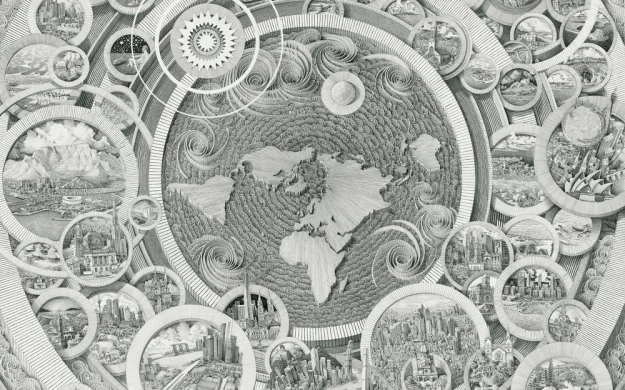
Map and Territory
Trump, Liberalism and Logic — Out already from the desert of the real
1. We are all mad here
I share these thoughts despite knowing they would resonate with very few of you at first. However, it’s an important timestamp on the fossil record of Spacemesh’s thinking and assumptions as we launch. And it is helpful as context — as a looking glass from which to observe the ethical implications of our future actions.
One distinguishing feature of Alice in Wonderland’s Cheshire Cat is a periodic, gradual disappearance of its body, leaving one last visible trace — its iconic grin.

“We are all mad here”
2. NOT A PIPE
Semantics, the (seemingly unrelated to crypto) branch of linguistics and logic concerned with meaning, What do words mean? How do we know what they mean? And who gets to decide?
The first thought of many when they see these questions is “who cares?” But they aren’t trivial at all. Think about it for a moment: private thoughts swirling around in our lonely, isolated brains — with the short extra step of speaking or writing in between — are transferred into someone else’s brain. In science fiction and fantasy, telepathy is often a fantastical ability. But we humans already have the most advanced interactive telepathy on the planet, Very fabulously cool. But how exactly do words key into the mental concepts that we want to communicate?
And what the heck does it have to do with Spacemesh?
In this essay we seek to show the unequivocal reason humankind needs cryptocurrency, from the lens of semantics — the way words convey meaning.

This is NOT a Pipe — René Magritte
3. The Pursuit of the Perfect Language
Language has power, and there are many people who wish for nothing more than to shape and control that power.
They may not say so in those exact terms, but the way they talk *about *language makes it clear: improper language is literal “violence”; proper language is revolutionary, enlightening, and emancipatory.
Many of the people who assert these things about our language are in positions of power, or at least positions of prestige. They want us to believe that we can shape reality simply through the way we talk *about *reality. And, in effect, to limit our shared reality to only that which matches their idea of “perfection”.
To the average person, this desire is ludicrous on the face of it. And yet it is one that stretches far more deeply than even the obvious “wokeness” it probably brought immediately to mind. Modern Progressivism, and its “woke” iteration, is just the latest manifestation of an idea that has been influencing humanity for centuries.
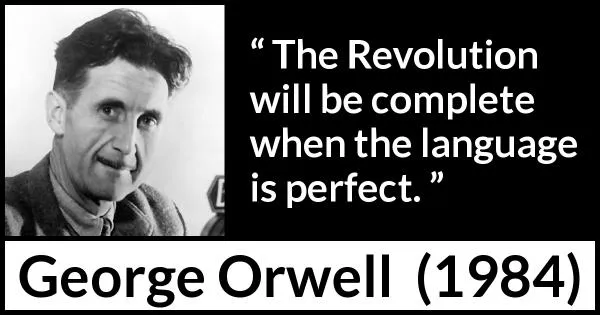
Predicted in June 8, 1949🙈
4. The Liberal Delusion
The notion of a “directional history”, a “progressive” history that moves towards some kind of utopian culmination, was originally a religious one — exemplified in the eschatology of various Abrahamic faiths. When the ideas of liberalism started to take shape in the Enlightenment, this religious preoccupation was assimilated, but secularized. Whereas Abrahamic religions see the coming utopia as the result of the interplay between humanity and the divine, the liberal worldview conflates the two into one. In this view, humanity is not in *dialogue *with the divine; humanity is the divine.
And, likewise, humanity can shape creation with words just like the God of the Abrahamic faiths once did.
You may be skeptical of this assertion. Can it really be true that such avowedly secular and “rational” ideas are actually based upon a superstition that ultimately traces back to very deep religious roots?
To answer this question, let’s look at the modern paradigm of “human rights”. When these rights were first conceived, they were done so with a firm basis in the religious notion that all humans are created in the image of God, and are therefore spiritually equal. Without this a priori assumption, how would one even approach the ballpark of something like “human rights”? Indeed, before the Abrahamic faiths brought with them the notion of “divine law” and “equality of the spirit”, it had never occurred to anybody that all humans are equal in any capacity. Quite the opposite: the pre-Abrahamic world operated on the assumption of natural human inequality. The law codes of the ancient world all had provisions relating to social class or caste.
None of this is intended to disparage the idea of human rights or equality under the law: only to show that these are not ultimately secular ideas.
The a-priori assumptions of liberalism are religious in nature, so it is not such a stretch that they embrace other “non-rational” ideas — while staunchly insisting that they are merely applying “reason”.
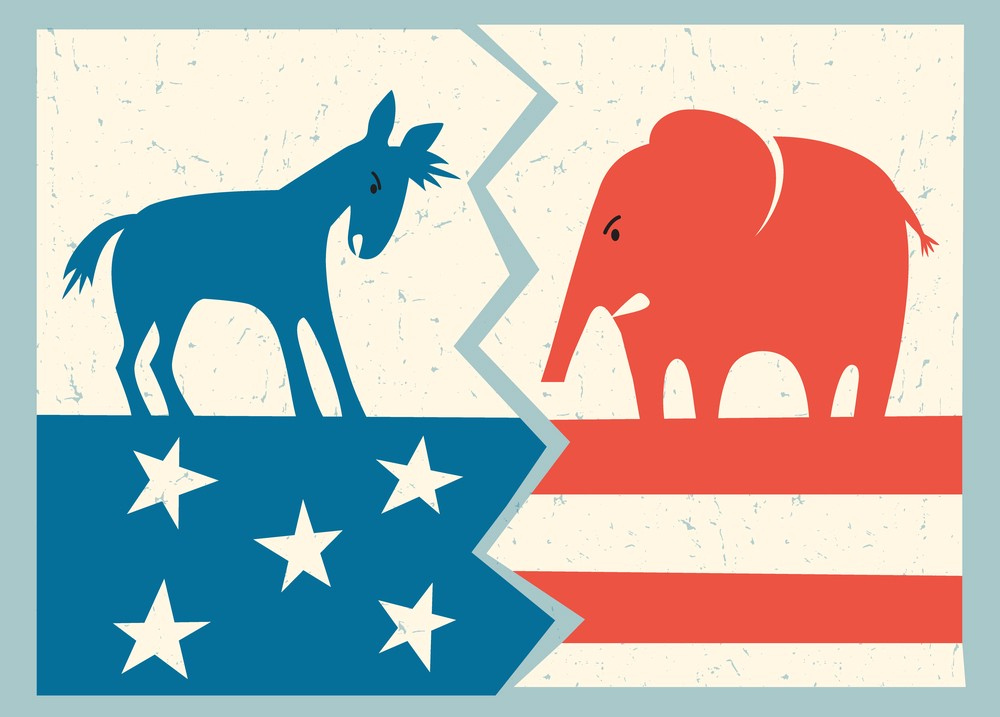
The Unattainable Conflict — Will this ever stop?
5. Liberals, Liberals Everywhere
But the “woke” and far-left aren’t liberals, are they?
It’s true that they reject many of the foundations of the little-l liberalism that is so pervasive in the world today. They do not like freedom of speech, for example, and often reject liberal “reason” in favor of “lived experiences”. But these differences are a matter of praxis, and are often cosmetic. When it comes to the power of language and the “end of history”, all of them are in accord.
They are, in a sense, splinter denominations of the same base religion. And, as with so many religious conflicts, the discord that arises between them is the narcissism of small differences.
All of them seek to perfect humanity, and reach their eschatological goals, through the “perfect language”.
But in order to understand just how destructive this pursuit of the perfect language is, first we need to understand how language even works.
6. How Words Get Their Meaning
The ability for a word to have a definition was traditionally understood, when it was questioned at all, as whatever meets the conditions for both necessity and sufficiency. A word’s meaning is understood as the criteria that excludes all non-X’s, but includes all X’s.
To be an American it is sufficient yet not mandatory to be born in America, however there are other criteria p[x] to become American. So the definition of “American” would be all those born in America or meeting p[x].
There are obvious problems with the approach that excludes all non-Xs, but includes all Xs; words that are synonymous in their factual definitions, but different in their emotional connotation, rhetorically create an intrinsic bias towards or against a piece of information.
Philosopher Bertrand Russell uses the following examples to describe the phenomenon (I = positive connotation, you= neutral connotation, he = negative connotation) :
- I am firm, you are stubborn, he is a pig-headed fool.
- I am righteously indignant, you are annoyed, he is making a fuss over nothing.
- I have reconsidered the matter, you have changed your mind, he has gone back on his word

Arguably, the most influential Philosopher of 20st century
7. NOT COMMON CORE / FAMILY RESEMBLANCE
Austrian-British philosopher* Ludwig Wittgenstein* was first to reject the idea of intrinsic meaning — of a dictionary definition capturing a “common core” to all the words with shared meaning. He was the first to explain that this doesn’t matter!
He pointed out that we learn and know the meaning of words by hearing the way other members of our linguistic community use them. A dog for us is what we piece together observing those things our fellows refer to as dogs, in a process of recognition that Wittgenstein called “family resemblance”. You know how you can just see the family relation between people sometimes?
Rather than rigid definitions, Wittgenstein said word meanings are like cluster concepts. There’s no single element that everything in the cluster has in common, but they all share something with some other members of the group. Language is a living phenomenon, and like most living things, there’s going to be change and variation.

Cluster Concepts
To summarize Wittgenstein’s position: “meaning is use.” As long as a linguistic community uses a word in a particular way, it has that meaning. “Mouse” didn’t used to mean a computer pointing device , but now it does. We make-up words as we need them. And at the same time, words also fall out of use, or take on entirely new meanings. Now, this view of language assumes that meaning is tied to a particular linguistic community. And a community might, or might not, span all of the speakers of that language.
But is it possible to have an entirely private language?

Direct Translation?
8. NO BEETLE IN THE BOX / NO PRIVATE LANGUAGE
To illuminate the radical break Wittgenstein makes in the concept of meaning, he asks us to imagine that each of us has a box, and inside each box is something. We all refer to the thing in our box as ‘a beetle,’ but no one can see inside anyone else’s box, ever. We all call our hidden thing a beetle, but we have no idea if the content of our boxes is the same. Wittgenstein said there’s no way we can meaningfully use the word ‘beetle’ in this context, because we have no way of verifying what others mean when they use the word, and they have no way of verifying what we mean. This is intended to illustrate how it’s impossible to directly communicate our subjective experiences.
We all use the word “red” to refer to the color we see when we look at a stop sign, but I have no way of knowing if you’re actually seeing the same thing that I’m seeing. I don’t know if your pain feels like my pain or your love feels like my love. Our minds are like boxes. No one else can see what’s inside. But here’s the thing: it doesn’t matter. Because “beetle” just means: “what’s in the box”. It could literally be a beetle, or it could be a Pokemon! The point is, we don’t know if the color red in my mind is the same as the color red in your mind, because the color red is a beetle in a box. It’s a label for what’s in our minds. So language, Wittgenstein said, can’t refer directly to an internal state, like what it’s like to see the color red, or to experience pain. Instead, it can only refer to the aspect of the concept or experience that’s publicly observable by other people.
Traditional concepts of meaning (or of what we call the Cartesian picture — “I think therefore I am”) differ drastically from this “beetle in the box” paradigm, asserting we subconsciously recognize some conceptually perfect “form” matched to “private theaters” in our mind — where we entertain our private meanings. But Wittgenstein says that the picture is reversed: using words in sync with each other is the starting point. It is our shared understanding of reality, and not some perfect form, that determines the meaning of our words.
For us humans, there is no “bare reality” that is not conceptual or full of meaning.
No Private Language Means No Perfect Language
The question of meaning and who gets to decide may seem like an esoteric question, but it has broad implications for every aspect of our lives. For example: What is legal? What is ethical? What is beautiful? What is dangerous? What is worthy? What is true?
If language can only exist in the realm of social consensus — if there really is no “beetle in the box” — then the quest to find the “perfect” ethics, aesthetics, laws, etc, will forever be a futile one. Because language must, by definition, be a compromise.
Denying the shared and negotiated nature of language often goes hand in hand with other denials of something like “human nature”. And while it would be very nice if top-down policies that ignored human instincts were merely harmless mistakes, this is very rarely the case.
Moreover, the futile pursuit of a perfect language is merely the starting point. This false starting premise leads to a whole slew of extremely sloppy, and often very dangerous, ideas.
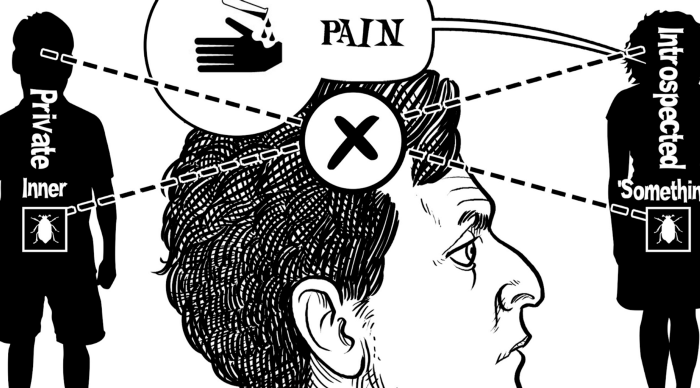
Mine is the first and only world I know!
9. The Bounds of Pure Logic
We’ve discussed how the liberal worldview can use deeply religious ideas as a-priori assumptions while vehemently denying their religious nature. This feat is accomplished by operating in a realm of pure, language-based “logic”. I put “logic” in quotation marks because it is not logic rooted in any kind of material reality.
For any truth argument, there are two ways that it might go wrong:
- One or more of the premises might be false.
- The conclusion might not follow from the premises.
Logicians are more concerned with arguments in general, with the second way in which arguments can go wrong. This study of whether the conclusion follows from the premises leads to the concept of an argument being “valid”: An argument is valid if and only if it is impossible for all of the premises to be true and the conclusion false.
The problem is that an argument can be logically valid but still be false. Or, perhaps more often, unfalsifiable: a claim for which “true” or “false” cannot really be determined.
There is value in unfalsifiable claims, of course. The aforementioned “human rights”, with its ultimate origins in the sphere of religion, is not something that should be discarded simply because it cannot be empirically proven.
The real danger comes in when one plays word games, taking flights of logically “valid” fancy, without any grounding in material reality whatsoever.
This is “rationalism”: the very foundation of liberalism and its derivatives.
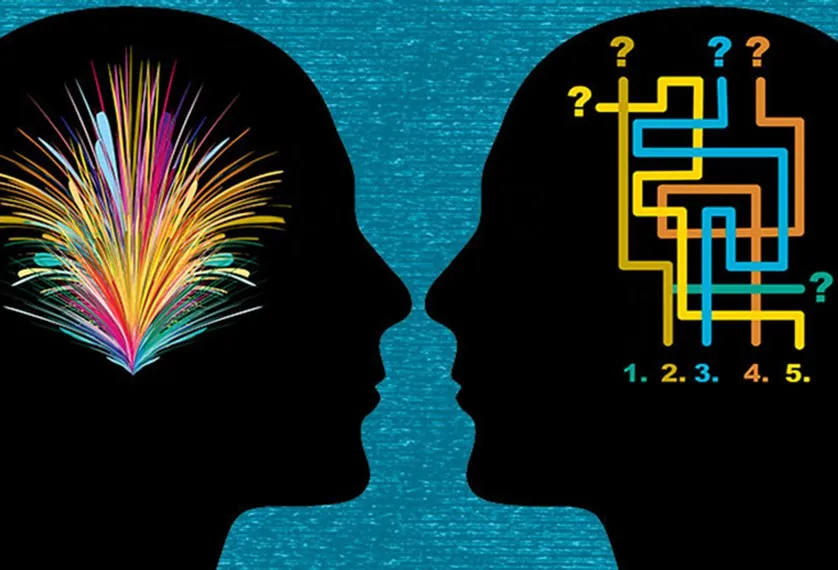
The Limits of Rationality
10. Rationalism, Faux Empiricism and Truth
One of the first “liberals” was Sir Fracis Bacon, who emphasized that we shouldn’t waste time on politics, but invest in science instead. That we can solve our political problems through science. We could also say that he was one of the first proponents of the peculiarly liberal social order that is so pervasive today: technocracy, aka “rule by experts”.
Rationalism, masquerading as empiricism.
The main problem with letting science drive our decision making, on the basis that one can empirically deduce everything of value within human existence, is that it contains several categorical errors in reasoning. Firstly, the a priori assumption that human intuition can never be trusted — a claim that itself is rarely subject to empirical scrutiny. Secondly, that the statistical averages used to test reality “empirically” in a socio-economic context actually reflect reality, when in fact they do not! They represent an artificially “normalized” version of reality, where individual outliers are “sampling errors”.
A good example of these assumptions at work is given by clinical psychologist Steven C. Hayes in the form of “developmental milestones”: stages that children “must” go through in order to develop normally. If a child does not crawl, the reasoning goes, then a child will not walk.
Except this is simply not true. There are many examples of children who never crawl but still walk.
The classical statistics through which technocrats make their “expert” analyses are based on the starting assumption of homogeneity. One that they know quite well to be false. The bell curve graphs that are so beloved of the social sciences only work if the phenomenon represented is stationary–that is, does not change over time — and the elements represented ALL obey the same dynamic model. Meaning every individual has to show the same mean and standard deviation.
In other words, they only work if human beings are assumed to be something other than human beings.

Pure Rationalism — Matthew Quick
11. Humans Are Not Molecules
In the 1880s, physicist Ludwig Boltzmann came up with the “ergodic theory” that’s used today for everything from water systems to designing your house. It was later proven and refined by mathematicians such as George D. Birkhoff and John Von Neumann.
This theorem purports to give us a mathematical framework for studying the behavioral average of complex systems over time.The thing is, ergodicity was traditionally applied to the field of physics, not the life sciences — and certainly not the social sciences.
However, around sixteen years ago, a school of thought emerged where human behavior was assumed to be ergodic, and could thus be approached as one might approach a more traditional ergodic system — like a cloud of gas. This was, in effect, an even more stringent application of the homogeneity assumption at play in classical statistics.
But humans are not anything like chemically identical molecules in a cloud of gas. Each human is a complex system unto themselves, composed of trillions of cells, along with trillions of symbiotic bacteria and viruses.
So you see, this is not empiricism. This is a mirage *masquerading *as empiricism. An attempt to shape reality according to the “perfect language” of ergodicity and homogeneity, rather than describe reality as it actually is.
Because describing reality as it actually is, when you’re dealing with complex systems built upon an aggregation of complex systems, is HARD. It requires dynamic *participatory *knowledge — feet on the rough ground, getting feedback from our dynamic and ever-changing world — and cannot meaningfully be simplified into convenient bell curves.
But the liberal technocratic class will continue to do this, because a perfect language *requires *a deterministic system where the same outcomes can be assured given the same input — the kind of system to which ergodicity applies.
12. Material Logic
This false empiricism gives the illusion of material logic, which is concerned with the truth of the claims made in a logical argument. But in reality it falls into the realm of formal logic, where the chief concern is the validity of the conclusion based on the premises. Where the truth of an argument is of only secondary consideration.
In other words, it’s concerned with the *method *of deriving one truth from another. The distinction between these two branches of logic was nicely described by G. K. Chesterton:
Logic and truth … have very little to do with each other. Logic is concerned merely with the fidelity and accuracy with which a certain process is performed, a process which can be performed with any materials, with any assumption. You can be as logical about griffins and basilisks as about sheep and pigs … Logic, then, is not necessarily an instrument for finding out truth; on the contrary, truth is a necessary instrument for using logic — for using it, that is, for the discovery of further truth … Briefly, you can only find truth with logic if you have already found truth without it.
Those who wish to shape reality through language, as opposed to allowing language to evolve naturally in response to a shared consensus of reality (that is, to function as it does organically) are ideologically opposed to the introduction of genuine material logic. While they may pay lip service to ideas like evolution (especially if it’s to mock their political enemies who reject evolution on religious grounds), which is the study of how complex biological systems adapt to material conditions over time, they are hostile to many of the conclusions that must inevitably be drawn from observing the evolutionary process.
(Ironically, the people most hostile to material logic are self-described “materialists”, who subscribe to deterministic ideologies which fall squarely into the secularized eschatology of the Enlightenment.)
13. Decontextualization in Time and Space
Perhaps one of the most striking examples of the liberal rejection of material logic is the impulse to vilify historical figures on the basis of contemporary modern sensibilities.
This isn’t to say that we should praise the figures of the past for doing things that are now understood to be morally wrong. Moral relativism is conceptually just as misguided. But the liberal impulse goes far beyond this: they desire to view historical figures only through the lens of morality, rather than ethics.
Unlike morality, ethics are NOT about what is right or wrong, but how to be most effective in the pursuit of actionable goals. And therefore, ethics are constrained by the material factors of the societies in which they emerge. Every single individual, no matter how moral, has their choices constrained by numerous factors. And when we judge ethical individuals in the past, who were bound by constraints that we presently are not, it essentially denying that these constraints exist.
Likewise, it’s denying the limitations of our own understanding. For every constraint that we know *could *have existed, there are countless others that are possible. Morality is an ideal — and one that is virtually impossible to meet. Ethics, meanwhile, are grounded in material logic. They come into friction with the rough ground of material reality.
Indeed, to pursue pure morality–arguably the ultimate objective of a “perfect language” — is a practical guarantee of *unethical *behavior. Because the material constraints do not go away if we ignore them. They simply catch us unawares, resulting in more harm overall.
There really is no ethical behavior under late modern positivism.

Proof of Space and Time, the temporal and spatial context of subjective
14. Whig History and Its Malcontents
Earlier, I discussed the liberal notion of directional history. The belief that history is the unfolding of humanity improving itself, technologically as well as morally.
But why would anybody (me, for example) be opposed to the idea of “moral progress”?
This question perplexes many people for whom directional history is a cherished dogma. To the point that they can only conceive the opposition in terms of nefarious motives. For example, this NYTimes piece claims “Truth” itself is under attack.
But this isn’t the case at all! The opposite, in fact.
Most things that exist in the world existed a long time before science could explain how things were put together. Humans use language to describe the world they live in and to describe their interactions in the world. These activities don’t require science or philosophy in order to be pursued. Aesthetics and ethics are not scientific, and efforts to provide objective descriptions and foundations are basically language games.
Cultural activities that are bound up with human life have shaped human languages — ways of taking and perceiving that require us to step outside science or logic or metaphysics. These activities have no objective basis and may even seem to to mess with the “grand theories of everything” that are so coveted by the liberal technocracy.
Never will we have a final understanding of the entire network of everything, and we must never stop the quest for more and more complex systems that are modeled over time and in a contextually sensitive ways.
At this point, I’d like to be clear that science is not my enemy. Indeed, science is the single most important infinite game we play. Science, when approached modestly, and with the right ethical framework, has insane potential to improve human flourishing. But when soothsaying (see: predictive models which treat human beings like molecules in a gas cloud) is put forth as “science”, we have completely lost the plot.
This tension between lateral and real is exemplified in the difference between the literal and the real — In this brilliant video Hillary Clinton speaks an ideal “literal” but ultimately meaningless speech. The reference to the novel *1984 in apt, *as this is the work which introduced the term “Newspeak” to the world; the aspiration for perfect thoughts, based on a perfect language, where translation is immediate and automatic between thoughts/words and the action they point to.
Although at this point the term has been abused so often that it’s come to be a cliché, it’s precisely because of its descriptive power and resonance with what’s clearly happening in real life.
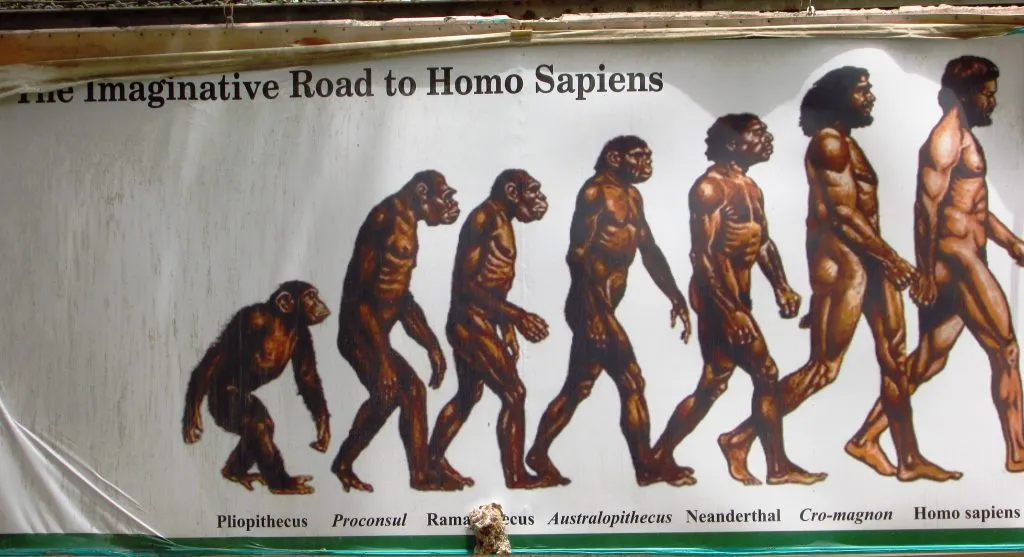
"March of Progress”: a misleading, over-simplified, whiggish presentation of evolution
15. The Inevitable Backlash
You can only spit in the face of human intuition for so long before people get fed up. You can only play logic and language games for so long before, eventually, something is going to give.
And we’re seeing that happening now, with the rise of global populism exemplified in the figure of Trump. That is, a figure whose entire modus operandi is flouting the “perfect language” imposed by the technocratic and academic elites.
It’s true that a contingent of Trump’s supporters are just reactionaries and fascists, latching on to any “dissident” they can find. But the vast majority of people who were inspired by Trump were simply sick of the ever-bolder attempts to impose a kind of normative tyranny in the form of “perfect language”, or being reduced to points on a bell curve.
Somebody like Trump emerging was practically made inevitable by these clumsy, misguided attempts to “perfect” humanity in the interest of “moral progress”. And more like him will come so long as this continues.
For an alternative to these dangerous language games, I invite you to read the accompanying piece on Conscious Evolution.
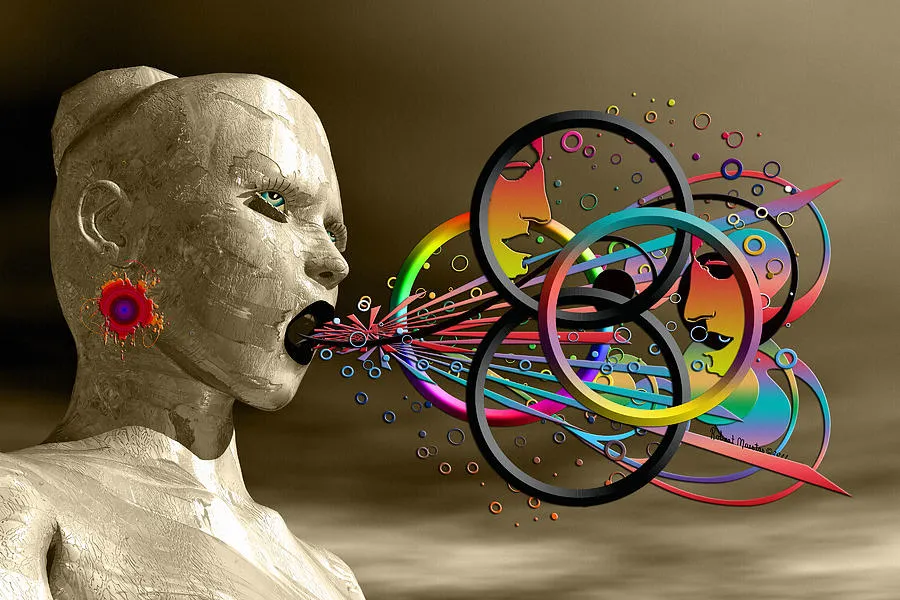
Linguistic Specialist, by Robert Maestas
For now and before we move to onwards to the relevant to all this let’s conclude what we’ve proposed:
- No private language — no direct translation from words to actions.
- Meaning is use — there often is no intrinsic common core meaning as meaning, rather family resemblance.
- The reason we sometimes understand each other nonetheless is, “No beetle in the box” — it cancels out.
- Our mind acquires an external reality, meaning needs to be given only a posterior!
- All of us once committing choices in reality inside time, occasionally encountering a rotation event of both reaffirmation and expansion to logic, if you get out of your head and LOOK.
Finally, How does all of this relate to crypto?
16. Money As Language
We take money for granted, but what actually is money at the end of the day?
It’s a language.
Money, like language, is a medium of communication that enables individuals and societies to express and exchange value. It is a system of symbols and representations that holds meaning and allows for complex interactions between individuals and groups. In this sense, money can be thought of as a form of language that communicates economic information. Here are some key ways in which money functions like language:
- Shared understanding: Money relies on a mutual understanding of its value among the participants in an economy, just as language relies on a shared understanding of words and grammar among its speakers. People must agree on the worth of a particular currency or form of money for it to serve its purpose effectively.
- Standardization: Both language and money are standardized systems. In language, we have grammar rules, vocabulary, and syntax that create a structure for communication. Similarly, money is standardized in the form of coins, banknotes, and digital currencies, which are regulated by institutions to maintain their value and ensure a consistent system for exchange.
- Symbolism: Money, like language, is symbolic. The physical form of money (e.g., coins, banknotes) or its digital representation (e.g., numbers on a screen) is not inherently valuable but derives its value from the societal agreement that it represents a certain amount of purchasing power. Similarly, words and phrases in a language are symbolic representations of ideas, feelings, and concepts.
- Expressive capacity: Language allows us to express our thoughts, emotions, and desires, while money enables us to express and assign value to goods and services. By exchanging money, we communicate our preferences, needs, and priorities, shaping our economic landscape.
- Evolution: Both money and language evolve over time as societies change and adapt. In language, new words and phrases are created to express new concepts, and old ones may fall out of use. Similarly, money has evolved from bartering systems to metal coins, paper currency, and now digital and cryptocurrencies. This evolution is driven by technological advancements, social changes, and the needs of users.
- Cultural influence: Just as languages have regional variations and dialects that reflect the culture and history of a place, money can also be a cultural artifact. The design of currencies, the use of specific materials, or the adoption of particular economic policies can reflect a society’s values, beliefs, and history
- Language: Money functions as a language because it serves as a standardized, symbolic system that facilitates communication and exchange of value. It relies on a shared understanding among participants, evolves over time, and reflects the culture and history of the societies that use it.
And so, everything we’ve discussed above also applies to money.
- There is no private money.
- Our minds acquire the meaning of money, as opposed to shaping it.
- This process is done through an imperfect consensus full of compromises.
However, money is not just any kind of language. It is a *measurement *language. Meters, kilograms, inches and pounds are all linguistic constructs, and an integral part of how we communicate with each other. But how well could we communicate if a meter in Paris was not the same thing as a meter in London? If a pound in Los Angeles was different from a pound in New York?
And yet, that is precisely what we have done to money.

The Tower of Babel, In Repeat
17. Monetary Newspeak
Money is particularly vulnerable to the liberal impulse to create a perfect language, especially when this ideology becomes the mainline establishment. In many ways, the manipulation of our monetary language is ground zero to the rest of what’s going on.
Money, even more than other kinds of language, requires a clear basis in material logic. Language is an imperfect social compromise, by definition, but introducing material logic can help us to reduce this ambiguity. Which is quite important when it comes to the way that we transact with each other!
This is where commodity-based money comes into play.
In the commodity-based monetary system, we sample a finite commodity — gold in the past, energy today, Space over Time tomorrow — to serve as a unit of economic measurement in the same fashion as a sampled metal rod can serve as a standard of length. Those that believe in the superiority of fiat currency don’t see the need for binding. And why would they? They want to be able to manipulate the meaning of money with impunity.
18. Material Logic and Honesty
Bitcoin, the first real cryptocurrency, re-introduces the concept of material logic by binding itself to material constraints. The main feature of this logic is the inability to change “the story” — that is, the ledger — retroactively.
I’m sure you’ve noticed how easy it is to confabulate a satisfying story about the past which plays fast and loose with the events that took place? All humans do this. Our brains are designed to invent a narrative in which we are not only the protagonists, but the heroes. If you’ve ever heard two individuals describing the same argument they had, this will not come as a shock! Now just imagine that all humans, including the silly arguments we have, were recorded and put in an unbreakable vault. There would be no more convenient just-so stories about this past. Even if our brains lie to us, the cold hard material reality would not. This is the power of material logic.
In reality, this would not be super great for our interpersonal relationships — or our self-esteem, for that matter. But in the realm of money, it’s the difference between an honest and dependable system and the one we’re stuck with today.
Without a bind to material logic I can present utterly untrue stories which end up at the same outcome as what actually happened. So the very novel and key concept of material binding, since introduces unavoidable ever growing cost associated with any aim for changing shared coordinated reality (our ledger) after the fact.
Fiat Money, I-owe-U Book-keeping, we believe, is a relativist mistake, of failing to recognize the importance of binding our abstractions to reality. Of “sampling” reality in order to make sure we are not collectively dreaming, a failure to give material logic its proper place. Language is an open system not a closed one, some words like game can not be defined rather only exemplified.

Our thoughts acquire the world, they are not simply conveying information.
Our thoughts acquire the world, they are not simply conveying information.
19. Crypto Against Newspeak
So, cryptocurrencies give us a way to resist monetary newspeak on our own terms.
This is accomplished on two fronts. Firstly, since money is a kind of language, then fiat money — which can be printed at will — represents an attempt to manipulate that language. Secondly, by creating an immutable ledger, the records of the past can’t be changed to obfuscate unethical or criminal behavior.
Fiat currency grants unscrupulous individuals the ability to use money as truth — to first get rich unethically and then use money to wipe away the trail pointing to their misdeeds. The ones who benefit most from printing money are the ones who get the influx of monetary supply first, before the ripples of confusion devalue that money too much. And once that money proliferates out to the rest of the population, it makes those who are already disadvantaged even worse off by decimating their savings.
But if we had some immutable way of keeping track of all of this, it would be much harder for us to be deceived in this way. It allows for us to agree on some basic truth and move onwards together. It shifts the entire game from “my word against your word” to “if you think you know better prove it”. Since money can’t be created out of thin air, and every transaction is publicly viewable on the ledger, the game of getting rich and then hiding your tracks is much harder to play.

Immutable way of keeping track, shifts the entire game
20. Environmental Concerns
Binding our money to material circumstances, sampling a number from spacetime we agree on even if we don’t agree on anything else — including the work that went into producing it (i.e by mining) — is one of the best things we can do for the planet.
This is because fiat money is the perfect vehicle for obfuscating externalities. The lack of a clear upfront cost for producing our money does not mean there is no cost — only that we cannot gauge it. Presently, this allows for even more corruption and dirty dealings than one would reasonably expect.
This isn’t to say that we have to settle for something as energy-intensive as Bitcoin in order to reap the benefits of money based on material logic; it simply means we should never give up the all-important reference point between language (money) and reality (sampled commodity). Without this friction between the territory called reality and our imperfectly constructed map called language, our world descends into the chaos, confusion, and mistrust that is so evident around us in the world today.
21. NFT
Once upon a time, a girl named Tascha bought a diamond, made an NFT out of it, and then smashed it.
You might think that the NFT would become worthless after this stunt, but the opposite happened. The value of the NFT only went up!
This experiment goes to the heart of the idea of “material logic” — whereby once something is “baptized” as a standard, the original meaning of the sampled object is assimilated into the meaning of the standard. The diamond as thing-unto-itself no longer mattered, just like there is no “beetle in the box”. The content of each person’s “box” is irrelevant to the shared public meaning of “beetle”, or in this case “diamond”.
Consequences:
1. A First Step, Not a Golden Bullet
I am not an adherent of secular eschatology found in liberalism and its denominations, and so I’m not here to promise a utopia. Turning away from the colossal failure represented by fiat money will not fix every problem we have.
But, by making us more accountable to the material constraints that bind our every decision, it will make *finding *the solutions a hell of a lot easier. Our path is simpler to navigate if we can see the obstacles in our way, instead of stumbling around in the dark. Or worse: stumbling around while wearing a VR headset.
The time has come to stop doing the same thing over and over again while expecting a different outcome. The time has come to start a new chapter in the human story, free from the grandiose delusions of the post-Enlightenment liberal consensus.
Let’s return to the rough ground, where we can build a better future, instead of grasping foolishly after a perfect one.
2. The Healthy Part of Speculation
Prosperity comes to those who successfully use their collective minds to discover new ground at the deeper structures of reality — to discover an adaptive and adaptable socio-economic phenotype. We need to always remain playful and open to new information. We should never take ourselves or our ideas too seriously.
3. The Modality Which Knew Infinity
It’s in knowing our limitations that we can also live up to our potential. Humans have the capacity to be inventors of ever-more complex yet sustainable forms of life, finding a way to self-regulate within a world of accelerating change. It also tells us what to do with our dreams, with our felt sense of potential and, crucially, that we have a *simple *toolset to guide us while chasing our dreams.
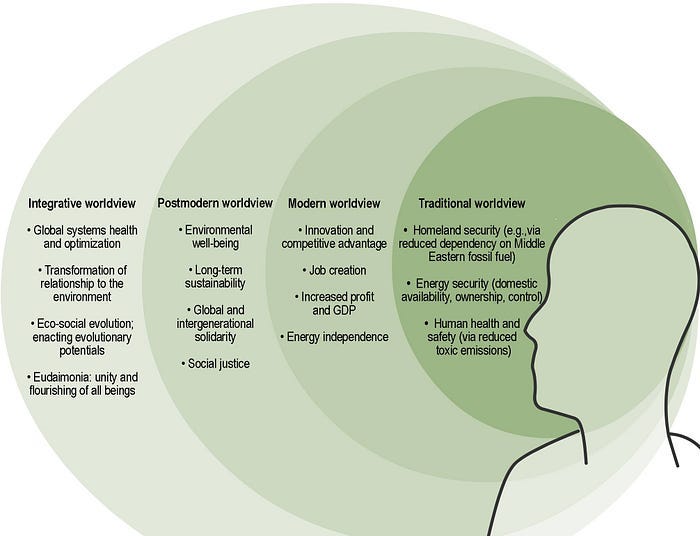
Everything Everywhere All At Once!
4. Deliberate Evolution
We need far more cooperation and coordination if we are to deal with a territory that moves faster and farther while our abstractions, our “map”, are only trying to catch up.
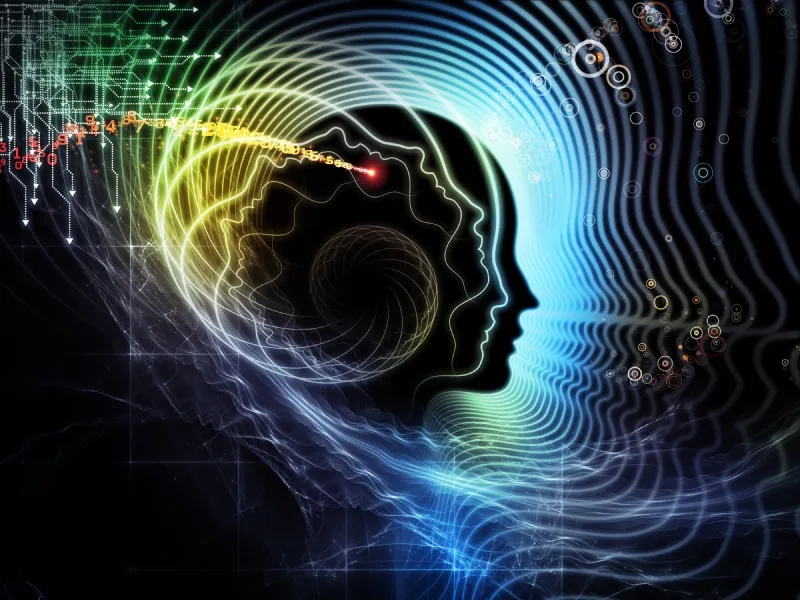
Conscious Evolution: Leaping Into Possibility
Join our newsletter to stay up to date on features and releases
